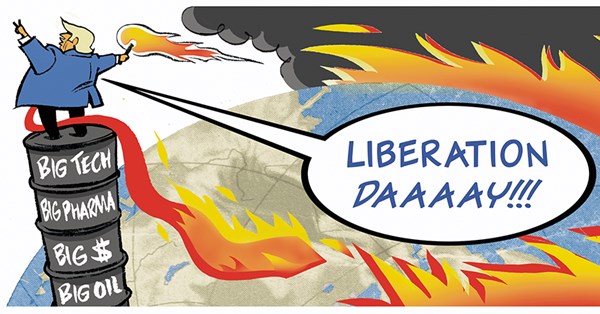PRESIDENT TRUMP has set fire to the global economy. Last week, on what he dubbed “liberation day”, he unleashed a world of pain, not least for a group of countries in the global South which will suffer tremendous impoverishment as a result of his punitive tariffs.
His announcement may yet prove to be the biggest economic event in a generation — exceeding the 2008 financial crash in its impact. It is a brutal reorganisation of the world economy, which, he hopes, will boost the power of the United States and the wealth of the oligarchs who stand behind him.
Although his eye-watering tariff hikes can seem incoherent and contradictory, there is a logic to what he is trying to do. First, President Trump hates income tax. He hopes that his tariffs will raise funds to extend his first-term tax giveaway to the super-rich — the biggest in US history; and, if foreign countries can pay for these tax cuts, so much the better.
The second reason for these tariffs is that President Trump wants to bully foreign countries into submission — forcing them to accept a range of demands from corporate America which will strengthen the US elite in the world. This will cause pain everywhere, but it will decimate the economies of a range of countries in the global South, from Cambodia to Madagascar and Bangladesh, which have been hit with extremely high tariffs.
In many instances, these countries geared their economies to export-led growth precisely because, as the Council on Foreign Relations has reported, they were told to by US and US-dominated institutions, such the International Monetary Fund. Now, they are being punished by that same country.
PRESIDENT TRUMP has sold these tariffs to the American public by telling it that he wants to bring jobs back to the US. He has played on the notion that American workers lost out as a result of globalisation and free-market economics; and he argues that tariffs can protect US industry and jobs from foreign competition.
There is truth in all of this. Globalisation was a project of Wall Street. The political, economic and environmental breakdown that we are living through is a product of this economic model, as many economists argue. Tariffs, done properly, can play a part in protecting industry. It is shocking that, in recent decades, countries in the global South have been stripped of that policy tool by trade rules and structural-adjustment policies.
But this is not President Trump’s main concern. These tariffs will not make life better for most ordinary Americans: they will cause huge inflation, and threaten a mighty recession. Furthermore, they will turbocharge inequality, both in the US and globally.
The UK Government seems to think that it can get a better deal by playing nice with President Trump and signing a trade deal that meets his demands. But the UK has received no special treatment: it has been landed with the same tariff rate as a range of countries that have taken very different approaches.
The UK Government now needs to learn this lesson: President Trump is a bully and will take whatever he can get. This is important, because, currently, the Government is engaged in negotiations for a trade deal that could have wide-ranging effects on the UK’s regulatory model. We know already that the President is demanding that the UK drop the digital-services tax, which was established to recoup some of the taxes doged by the Big Tech giants. It cannot be right that the UK gives Elon Musk a tax break at the same time as it cuts support for disabled people and international aid.
BUT the tax will be only one aspect of this deal. Big Tech hates the UK’s rules about safety online. It wants the most light-touch regulation on new technologies such as AI. It demands the right to use and abuse our most personal data, such as medical data collected through the NHS. Big Tech companies do not want us to be able to challenge their monopoly power, whether that be proprietary plug sockets on Apple phones or their ability to demand unreasonable terms from small businesses and suppliers.
These are proper subjects for democratic debate and parliamentary scrutiny, not behind-closed-doors trade talks. The UK must not give up vital protections while President Trump holds tariffs over its head. Rather, it should stand up to this bullying, showing solidarity with all those affected, especially the poorest.
The good news is that this would allow us to start building a very different economy: one not based on the demands of the richest, but on protecting people and the environment; not leaving everything to the free market, but allowing us to plan and co-ordinate how the economy should work. Already, our neighbours are planning a range of responses to Trump, looking not only at tariffs, but at the terms on which they allow US finance, Big Tech, and Big Pharma to operate in their markets.
At this stage, there is no pain-free option. In the coming years, this country should protect those who will struggle, but keep its eyes fixed on the sort of economy that it wants. We cannot simply go back to the sort of free-market economy that produced so many of our problems.
This is a frightening moment. But from such moments truly transformative change can come about; and change has never been needed more than now.
Nick Dearden is the director of Global Justice Now.

















